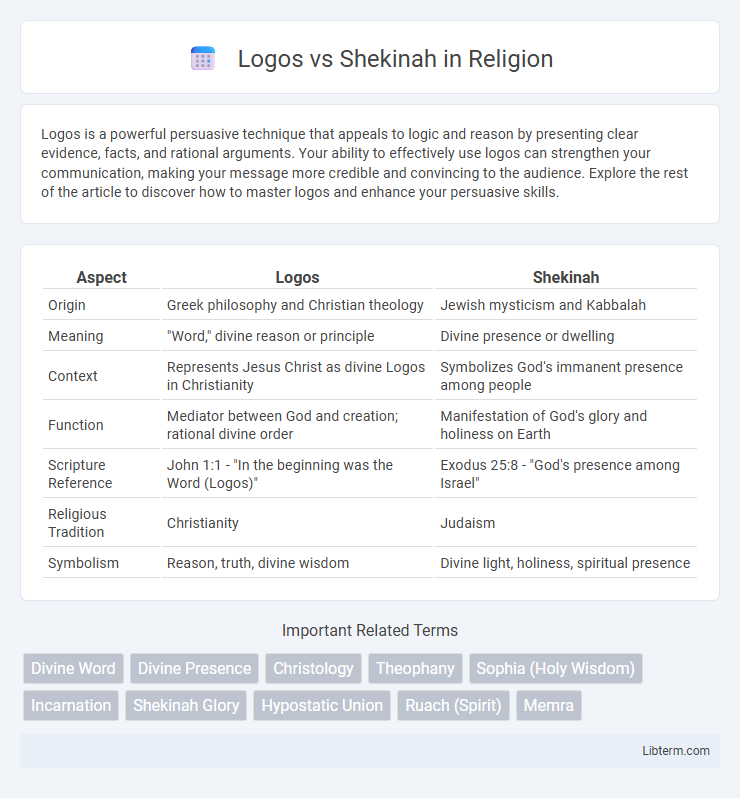Logos is a powerful persuasive technique that appeals to logic and reason by presenting clear evidence, facts, and rational arguments. Your ability to effectively use logos can strengthen your communication, making your message more credible and convincing to the audience. Explore the rest of the article to discover how to master logos and enhance your persuasive skills.
Table of Comparison
| Aspect | Logos | Shekinah |
|---|---|---|
| Origin | Greek philosophy and Christian theology | Jewish mysticism and Kabbalah |
| Meaning | "Word," divine reason or principle | Divine presence or dwelling |
| Context | Represents Jesus Christ as divine Logos in Christianity | Symbolizes God's immanent presence among people |
| Function | Mediator between God and creation; rational divine order | Manifestation of God's glory and holiness on Earth |
| Scripture Reference | John 1:1 - "In the beginning was the Word (Logos)" | Exodus 25:8 - "God's presence among Israel" |
| Religious Tradition | Christianity | Judaism |
| Symbolism | Reason, truth, divine wisdom | Divine light, holiness, spiritual presence |
Understanding the Concepts: Logos and Shekinah
Logos, rooted in ancient Greek philosophy and Christian theology, represents the divine reason or word that orders the cosmos and reveals God's rational purpose. Shekinah, a Hebrew term in Jewish mysticism, signifies the divine presence or dwelling of God among people, emphasizing God's immanence and holiness. Understanding Logos involves grasping a metaphysical principle of cosmic order, while Shekinah centers on experiencing God's manifest presence in the material world.
Origins of Logos in Western Philosophy and Theology
The origins of Logos in Western philosophy trace back to Heraclitus, who conceived it as the rational principle governing the cosmos. This concept evolved in Stoic philosophy, where Logos represented the divine reason permeating the universe and human soul. In Christian theology, Logos was further developed in the Gospel of John as the pre-existent Word (Logos) made flesh, uniting Hellenistic philosophical traditions with Judeo-Christian beliefs.
Shekinah: Origins and Meaning in Jewish Thought
Shekinah, derived from the Hebrew root "sh-k-n" meaning "to dwell," represents the divine presence or dwelling of God within the world, especially in Jewish mysticism and theology. Unlike Logos, which originates from Greek philosophy signifying divine reason or Word, Shekinah embodies the tangible, immanent presence of God among His people, often associated with light, glory, and sanctity. In Jewish thought, Shekinah is central to understanding how God interacts intimately with humanity, manifesting in the Tabernacle, Temple, and moments of spiritual revelation.
Comparative Etymology: Logos vs Shekinah
The term Logos, rooted in ancient Greek philosophy, signifies "word," "reason," or "principle," reflecting a rational, universal order integral to Hellenistic thought and early Christian theology. Shekinah, originating from the Hebrew root "shakan," meaning "to dwell" or "to settle," denotes the divine presence or manifestation of God residing among people in Jewish mysticism and Rabbinic literature. While Logos emphasizes an abstract, intellectual divine principle, Shekinah conveys a tangible, immanent experience of God's presence, highlighting contrasting yet complementary conceptions of divine interaction in Western religious traditions.
The Role of Logos in Christian Doctrine
Logos in Christian doctrine represents the divine Word or reason, identified with Jesus Christ as the pre-existent Son of God who embodies God's creative and redemptive power. It signifies the rational principle sustaining the universe and the revelation of God's mind made flesh through Christ's incarnation. This concept underscores Christianity's understanding of Jesus as both fully divine and fully human, bridging the gap between God and humanity.
Shekinah’s Spiritual Significance in Judaism
Shekinah represents the divine presence of God dwelling among humanity, embodying spiritual illumination and comfort in Jewish mysticism and theology. It symbolizes God's manifestation in the world, often associated with God's immanence and the nurturing aspect of the divine in human experience. Unlike Logos, which emphasizes divine reason and cosmic order, Shekinah highlights the intimate, relational connection between God and the Jewish people.
Manifestations: Logos as Divine Word, Shekinah as Divine Presence
Logos represents the Divine Word, embodying reason, order, and the creative principle through which the universe is structured and sustained. Shekinah signifies the Divine Presence, manifesting as a tangible, immanent experience of God's glory dwelling among people, often associated with light and holiness. Together, Logos and Shekinah illustrate complementary dimensions of divine manifestation: the transcendent creative Logos and the immanent, relational Shekinah.
Intersections: Where Logos and Shekinah Overlap
Logos and Shekinah intersect in their representation of divine presence and wisdom within spiritual traditions; Logos symbolizes the rational divine word or reason, while Shekinah embodies the immanent, luminous presence of God. Both concepts emphasize the manifestation of God's interaction with the world, bridging abstract divinity and tangible experience. This overlap highlights the fusion of intellect and spiritual illumination in understanding the divine presence.
Philosophical and Mystical Interpretations
Logos represents divine reason and universal order in classical philosophy, embodying the rational principle governing the cosmos, while Shekinah signifies the indwelling divine presence in Jewish mysticism, emphasizing experiential connection with God. Philosophically, Logos is associated with abstract, metaphysical principles as seen in Stoicism and Neoplatonism, contrasting Shekinah's concrete, immanent manifestation central to Kabbalistic thought. Mystical interpretations highlight Logos as the cosmic intellect linking human and divine, whereas Shekinah embodies spiritual illumination and the nurturing aspect of God's presence within the material world.
Contemporary Relevance: Logos and Shekinah in Modern Spirituality
Logos and Shekinah represent foundational concepts in contemporary spirituality, with Logos symbolizing divine reason and universal order, while Shekinah embodies the indwelling presence of God in the world. Modern spiritual movements integrate Logos as a principle of cosmic intelligence and Shekinah as a source of divine feminine energy, fostering balance between rationality and mysticism. This duality influences practices such as meditation, sacred arts, and interfaith dialogue, reflecting a convergence of ancient wisdom and modern spiritual exploration.
Logos Infographic

 libterm.com
libterm.com